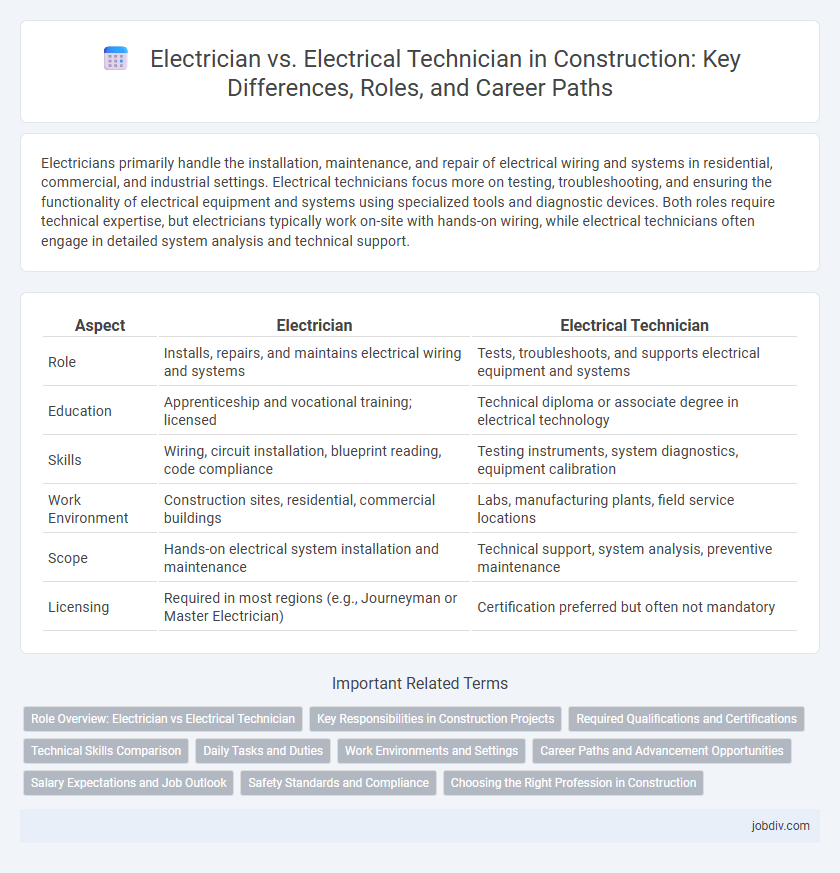Electricians primarily handle the installation, maintenance, and repair of electrical wiring and systems in residential, commercial, and industrial settings. Electrical technicians focus more on testing, troubleshooting, and ensuring the functionality of electrical equipment and systems using specialized tools and diagnostic devices. Both roles require technical expertise, but electricians typically work on-site with hands-on wiring, while electrical technicians often engage in detailed system analysis and technical support.
Table of Comparison
| Aspect | Electrician | Electrical Technician |
|---|---|---|
| Role | Installs, repairs, and maintains electrical wiring and systems | Tests, troubleshoots, and supports electrical equipment and systems |
| Education | Apprenticeship and vocational training; licensed | Technical diploma or associate degree in electrical technology |
| Skills | Wiring, circuit installation, blueprint reading, code compliance | Testing instruments, system diagnostics, equipment calibration |
| Work Environment | Construction sites, residential, commercial buildings | Labs, manufacturing plants, field service locations |
| Scope | Hands-on electrical system installation and maintenance | Technical support, system analysis, preventive maintenance |
| Licensing | Required in most regions (e.g., Journeyman or Master Electrician) | Certification preferred but often not mandatory |
Role Overview: Electrician vs Electrical Technician
Electricians install, maintain, and repair electrical systems in residential, commercial, and industrial settings, ensuring compliance with safety codes and regulations. Electrical Technicians primarily focus on testing, troubleshooting, and maintaining electrical equipment and components in manufacturing or technical environments. Both roles require a strong understanding of electrical systems, but electricians emphasize hands-on installation and repair, while electrical technicians prioritize diagnostic and technical support functions.
Key Responsibilities in Construction Projects
Electricians in construction projects primarily handle wiring installation, circuit troubleshooting, and ensuring electrical systems comply with safety codes. Electrical technicians focus on testing, maintaining, and repairing electrical equipment and systems to support operational efficiency. Both roles require collaboration to ensure seamless power distribution and system functionality on construction sites.
Required Qualifications and Certifications
Electricians typically require a high school diploma followed by an apprenticeship and must obtain state licensure, which involves passing a journeyman or master electrician exam. Electrical technicians often hold an associate degree or vocational certificate in electrical technology, focusing on system design, testing, and maintenance, with certifications like the Certified Electrical Technician (CET) improving job prospects. Both roles demand knowledge of the National Electrical Code (NEC), but electricians prioritize hands-on installation and repair, whereas electrical technicians emphasize diagnostics and system optimization.
Technical Skills Comparison
Electricians specialize in installing, maintaining, and repairing electrical wiring, systems, and equipment in residential, commercial, and industrial settings, with deep expertise in interpreting blueprints and adhering to electrical codes. Electrical technicians focus on troubleshooting, testing, and calibrating electrical components and systems, often using advanced diagnostic tools and software to ensure operational efficiency. Both roles require strong knowledge of circuitry, safety protocols, and electrical theory, but electricians emphasize hands-on wiring and installation skills, while technicians prioritize testing and system optimization.
Daily Tasks and Duties
Electricians install, maintain, and repair electrical systems in residential, commercial, and industrial buildings, focusing on wiring, circuit breakers, and electrical fixtures. Electrical technicians primarily conduct diagnostic tests, troubleshoot electrical equipment, and assist engineers with system design and maintenance using specialized tools and software. Both roles require knowledge of electrical codes and safety regulations, but electricians often perform hands-on installation while technicians emphasize testing and technical support.
Work Environments and Settings
Electricians primarily work on construction sites, residential buildings, and commercial properties, handling wiring, installations, and electrical repairs in physically demanding environments. Electrical technicians often operate in industrial plants, manufacturing facilities, and maintenance departments, focusing on testing, troubleshooting, and maintaining electrical systems and equipment. Both roles require adherence to safety protocols but differ in their typical settings and specific job functions within the electrical field.
Career Paths and Advancement Opportunities
Electricians typically undergo apprenticeship programs and licensing exams to perform installation and maintenance of electrical systems in residential, commercial, and industrial settings. Electrical Technicians often hold associate degrees or technical certifications, specializing in testing, troubleshooting, and supporting electrical equipment and systems. Career advancement for electricians can lead to master electrician status or supervisory roles, while electrical technicians may progress into engineering support, project management, or specialized technical positions in construction and manufacturing industries.
Salary Expectations and Job Outlook
Electricians typically earn higher salaries than electrical technicians due to their specialized skills in installing and maintaining electrical systems in construction projects, with median annual wages around $60,000 compared to $45,000 for electrical technicians. The job outlook for electricians is projected to grow 8% over the next decade, driven by new construction and infrastructure upgrades, while electrical technician roles are expected to grow at a slower rate of about 3-5%. Demand for electricians remains strong in residential, commercial, and industrial construction sectors, whereas electrical technicians often find opportunities in equipment testing, manufacturing support, and maintenance roles.
Safety Standards and Compliance
Electricians and electrical technicians both adhere to strict safety standards such as OSHA regulations and NFPA 70E compliance to ensure workplace safety and electrical hazard prevention. Electricians are typically responsible for installing, maintaining, and troubleshooting electrical systems in compliance with the National Electrical Code (NEC), while electrical technicians focus on testing, inspecting, and repairing electrical equipment to meet manufacturer specifications and safety protocols. Both roles require thorough knowledge of lockout/tagout procedures and personal protective equipment (PPE) usage to mitigate electrical risks on construction sites.
Choosing the Right Profession in Construction
Electricians specialize in installing, repairing, and maintaining electrical systems, ensuring compliance with safety codes and regulations on construction sites. Electrical technicians focus on testing, troubleshooting, and supporting electrical equipment and control systems, often working with complex circuitry and automation. Choosing between the two depends on whether you prefer hands-on electrical wiring and safety compliance or technical diagnostics and system optimization in construction projects.
Electrician vs Electrical Technician Infographic

 jobdiv.com
jobdiv.com